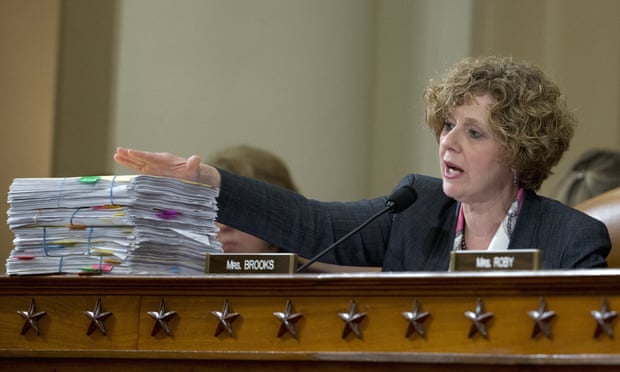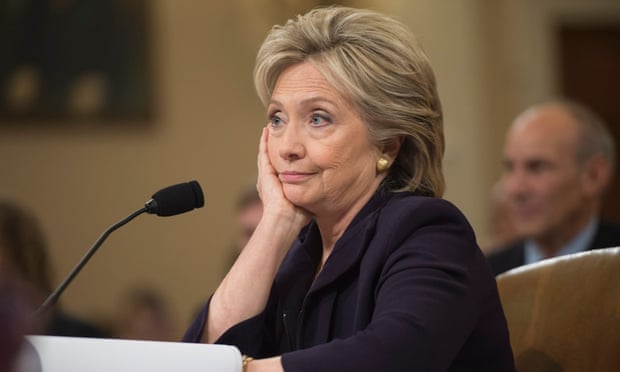Hillary Clinton put the controversy over terrorist attacks in Benghazi firmly behind her on Thursday after eleven hours of frequently meandering questions from conservative critics failed to dent the former secretary of state’s campaign for president.
In what may prove a defining moment in the 2016 race for the White House and a disappointment for her presidential rivals, Clinton shrugged off an intense focus on her private email use and an informal adviser at a long-awaited but ultimately deflated hearing before US lawmakers.
But the House of Representatives select committee on Benghazi largely failed to press Clinton on the reasons for US intervention in Libya or diplomatic security failings revealed in a critical earlier report commissioned by the State Department.
Instead, she was able to skewer critics of her emails by revealing that she did not have a computer in her office as secretary of state and received sensitive memos in locked briefcases that were removed immediately.
The rare glimpse into State Department security protocols took the wind out of conservative challenges which relied heavily on electronic disclosures, particularly messages found on a controversial private computer server.
Discovery of the server has overshadowed Clinton’s run for the White House and the congressional select committee on Benghazi that uncovered it. As the Democratic frontrunner prepared for day-long testimony before the Republican-controlled House group, critics of the committee argued that it has strayed from its remit of investigating the murder of Libyan ambassador Chris Stevens and three other Americans in the 2012 terrorist attack.
Yet as several former prosecutors on the committee leaned on this digital evidence trail to prove Clinton had failed to monitor deteriorating security conditions in Libya, she pulled a metaphorical rug out from a stack of printed emails presented to her by congresswoman Susan Brooks of Indiana.
“I did not do the bulk of my work on email,” replied Clinton. “Some of [the memos were] so top secret that they were brought into my office in a locked briefcase that I had to read and immediately return to the courier,” she added.
Once this was established, repeated attempts to draw inferences from the emails fell flat during more than three hours of morning testimony that could prove a turning point in the race for the White House if Clinton is able to escape relatively unscathed. The Benghazi hearing was seen as a lingering obstacle after a strong performance in last week’s debate among a dwindling Democratic field, which Vice-President Joe Biden declined to join on Wednesday.
Republican chairman Trey Gowdy made more headway when he contrasted the ease with which some informal advisers were able to reach and influence Clinton with Ambassador Stevens’ repeated requests for increased protection, which she says she did not receive.
“Our ambassador was asked to respond to Sidney Blumenthal’s drivel, on the same day that he was asking for more security,” said Gowdy.
Congressman Lynn Westmoreland claimed Stevens had sent more than 20 requests for extra security and asked if he had access to Clinton’s private email address in the same way.
The focus on Blumenthal, a veteran of Bill Clinton’s White House, nonetheless raised eyebrows among some Democratic observers. As the Clinton campaign chairman John Podesta tweeted: “After 17 months and $4.7m spent, their whole argument is about Sid Blumenthal?”
Gowdy defended his handling of the hearing, telling the Guardian that he was intentionally taking a deliberate pace: “As you notice, I’ve been pretty slow with the trigger. I’ve been letting her answer and letting questions go.”
Former congressman Ron Barber, who was one of seven Democrats to vote to create the Benghazi committee in 2014, on Thursday declared the enterprise “a political charade”. Barber, who was in town on business, spent much of the day in the hearing as a spectator and said he was appalled at the spectacle in front of him.
“There’s no there there,” Barber told the Guardian. “It’s just fishing that’s not catching any fish at all.”
Clinton also sought to deflect criticism that her diplomats faced excessive risks by launching an impassioned plea for more interventionist US foreign policy.
“America must lead in a dangerous world and our diplomats must continue representing us in dangerous places,” she argued. “They can’t do their jobs for us from bunkers.
“[The American people] expect us to rise above partisanship and reach for statesmanship,” added Clinton in one of several criticisms of the committee.
At times proceedings took a tetchy turn, as a stone-faced Clinton replied to what she appeared to view as patronising offers from committee members, then took to putting her head in her hand as she awaited familiar questions.
“Should I wait while you take notes from your staff?” asked Illinois Republican Peter Roskam. “No,” was the withering reply. “I can do more than one thing at a time.”
Similarly, when the Georgia-born Westmoreland introduced himself by saying he would be speaking more slowly, Clinton shot back: “I lived in Arkansas a long time, I don’t need an interpreter, congressman.”
And as tempers rose toward a lunchtime break, which saw growing rancour between Democrats and Republicans in the committee, Clinton allowed a faint smile and the occasional barbed comment to slip through an otherwise tightly controlled performance.
“Americans can live with the fact that good people sometimes give their lives to this country, but what they can’t take is when their government is not square,” said Ohio congressman Jim Jordan after raising his voice and waving his finger.
“I wrote a whole chapter about this in my book Hard Choices,” the former secretary of state replied dryly.
The hearing, which began at 10am and lasted until the early evening with only short breaks for lunch and voting, was held in a lavish congressional hearing room in the House ways and means committee.
Republicans were under pressure not to dwell on Clinton’s use of a private email server as too zealous an attack could come off as partisan. Instead, they highlighted the emails, quoting and pulling from them to punctuate their line of questioning about her role in the lead-up to and aftermath of the 2012 attacks.
Gowdy criticised Clinton’s use of a private email server in his opening statement, calling it an “unusual arrangement” but said her emails were not the focus of the committee’s investigation.
“Not a single member of this committee signed up for an investigation into you or your email system,” Gowdy said. “We signed up because we wanted to honour the service and sacrifice of four people sent to a foreign land to represent us – who were killed – and do everything we can to prevent it from happening to others.”
But as the day wore on, Republicans turned increasingly to scoring political points over the contents of the emails, rather than focusing on Clinton’s direct responsibility for the deaths in Benghazi.
As the marathon hearing dragged into the evening, Democrats accused their committee colleagues of trying “to wear the witness down” with increasingly hostile questioning.
The ranking Democrat Elijah Cummings claimed angrily that Republicans were using taxpayer money to try to “destroy a presidential campaign” with a “marathon grilling”.
But Republicans refused to heed calls for it to be brought to an end and chastised Clinton for laughing when she was asked if she spent the night alone after learning of the Benghazi attack.
Around 8.40pm, some 11 hours after the hearing began and with only 75 minutes of breaks, Clinton got a coughing fit. “Would you like us to take 60 seconds, a two-minute break?” asked chairman Gowdy. “No, I’ll just take a lozenge,” was the croaky reply.
“I’m just telling you, it doesn’t smell right,” said Congressman Westmoreland after one particularly protracted exchange about the emails.
“I am sorry it didn’t fit your narrative, Congressman,” concluded Clinton during a rare clash on the incident itself with Representative Jordan.
http://www.theguardian.com/us-news/2015/oct/22/hillary-clinton-benghazi-attack-hearing










